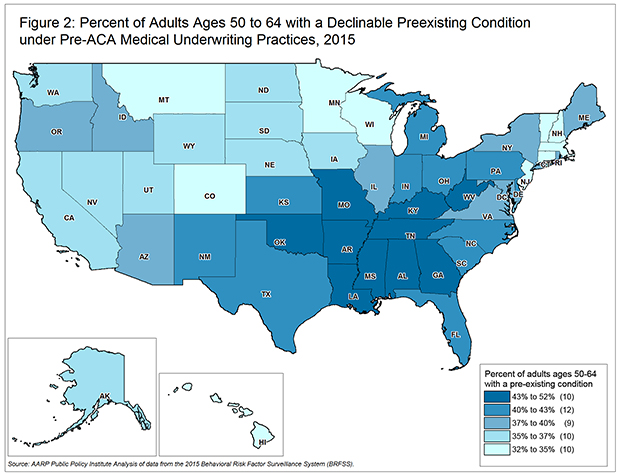
In Health Reform, Stakes are High for Older Americans with Preexisting Health Conditions
- Select a language for the TTS:
- UK English Female
- UK English Male
- US English Female
- US English Male
- Australian Female
- Australian Male
- Language selected: (auto detect) - EN
Play all audios:
by
Claire Noel-Miller
&Jane Sung
AARP Public Policy Institute AARP Public Policy Institute Published July 29, 2016As Congress considers changes to the Affordable Care Act (ACA), a key issue will be ensuring that people with preexisting health conditions have access to affordable health insurance
coverage. The ACA bans insurance companies from denying coverage, charging higher premiums, and imposing coverage limits or exclusions to people with preexisting health conditions. The
protections are especially important for older adults because they are more likely than younger adults to have health problems.
This Insight on the Issues examines the impact that eliminating or weakening the ACA’s protections for people with preexisting conditions would have on older adults ages 50-64. Building on
a recent report by Kaiser Family Foundation, this analysis finds that 40 percent of older adults ages 50-64 – or about 25 million people in this age group – could be denied health coverage
because of a preexisting condition if they sought to buy an individual plan. The analysis also found wide state-by-state variation in the prevalence of preexisting conditions among older
adults. At the high end, in some states, at least half of those between ages 50 and 64 have a declinable preexisting condition.
MORE FROM AARP
Impact of the American Health Care Act on States
The American Health Care Act would make health care unaffordable and inaccessible for millions of Americans.
Older District of Columbia Residents Face Health Disparities
The AARP District of Columbia Health Disparities Survey found that older DC residents east and west of the Anacostia River face stark health disparities.
Medicare Savings Program Enrollment Increases When States Expand Financial Eligibility Criteria
This AARP Insight reports findings from an analysis of MSP enrollment patterns in a sample of four states before and after the states expanded MSP eligibility criteria.
Policy Options to Improve Older Adults’ Health Insurance Affordability
Despite gains in health coverage and affordability under the Affordable Care Act (ACA), a significant number of Americans remain uninsured, including millions of adults ages 50 to 64, and
affordability and access barriers remain. Policymakers can pursue a wide range of options to improve access to affordable health coverage and reduce racial/ethnic and other disparities in
coverage.
Eliminating Access to No-Cost Preventive Health Services Could Affect More Than 12 Million Adults Ages 50 to 64
A Texas federal court recently ruled that the Affordable Care Act (ACA) provision of requiring most private health insurers to cover recommended preventive services without cost-sharing was
unconstitutional, putting access to no-cost critical preventive health services in jeopardy for millions of Americans. That decision is now pending appeal.
{ "maxItems":5, "itemsPerRow":"3", "rows":"4", "loadMore":"6", "adsNum":"0", "resultsLength":"5" }